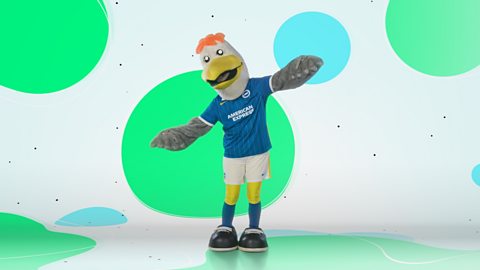Hi Super Movers! Let's learn about the emotions and feelings that we all experience. Here we go.
Feeling all these feelings, all these feelings come and go.
There's so many moods inside of you. There's so many you can show. We're all dealing with these feelings,
Make us behave in different ways. Sometimes they're easy. Sometimes they're hard. But showing them is all OK.
So what emotions can we feel?
When we're happy, we might giggle, we have a huge smile, we might dance, this is a great feeling that we can share. You should spread it while you can.
When something greats about to happen. You're full of energy. You might squeal.
You bounce around the room all day.
This is excitement that you feel.
How are you feeling? Are you feeling this, too?
What's the feeling that you're feeling inside of you?
Are you feeling this too?
I don't know about you, but I'm feeling great.
But what we don't feel so great. What can we do?
If you're feeling really down now and think that you might cry.
You're feeling sad, feeling hurt as the tears from your eyes.
These are difficult emotions, but you never need to hide. Share that feeling with someone you trust. You can tell them what's inside.
Tell them when you're angry
You can tell them when you cry,
Taking turns to say how you feel and why.
That person might have feelings that they want to tell you, too.
Well, listening up is a thing to do.
Ok, so we can feel happy or excited or sad or maybe proud, but now it's your turn.
What emotions and feelings can you feel?
OK, can you name any more?
Oh, that's a good one. Can I have a go?
Have you ever felt jealous?
Have you ever felt bored?
Have you ever felt confident?
Wow, that's a lot of emotions and feelings.
Feeling all these feelings, all these feelings come and go.
There's so many moods inside of you. There's so many you can show.
We're all dealing with these feelings, make us behave in different ways.
Sometimes they're easy, sometimes they're hard but showing them is all OK.
Showing them is all OK.
Showing them is all OK.
Rhys Stephenson performs this touching Super Mood Movers song about different feelings.
After viewing, singing and dancing along, your class could try some of these activities to further explore their learning:
Activities
- Naming feelings: Ask children to work in pairs to name all the feelings they can. Prompt children with: 'How would you feel if you were on your way to an adventure park? Or waiting in a long supermarket queue?' Tell the class: 'We're emotional creatures and that's OK. That's human. That's how we all are.'
- How do we show our feelings?: List all the pupils' suggestions for different feelings, such as: 'happy, sad, bored, excited, confident, safe, scared, thrilled'. Ask: 'How do people show their feelings?' Pupils could mime a simple action in response, for example eating an apple hurriedly, happily, dreamily, lazily, confidently, hungrily, thoughtfully.
- Are some feelings 'bad' feelings?: Ask pupils to identify feelings that are sometimes called 'bad' feelings. Ask: 'Why might somebody feel like this?' Encourage children to identify story characters who feel sad, lonely, angry or jealous. What made them feel that way? Guide the children's replies with: 'Are there times when it's OK to feel angry, or sad?' Gather the children's responses and make it clear that sometimes it's OK to have these feelings: no-one is happy all the time. Remind children bad times come and go and if they feel down, sad or angry, these feelings can pass in time.
- Ways to cope: Ask - 'Are there ways we can cope with feeling angry or unhappy? If I feel angry for instance, what could I do to feel better?' Prompt children to suggest things you could do to help you deal with negative feelings, such as: 'take time out if you're angry'; 'take some deep breaths'; 'walk away from an argument if you can' or 'tell someone you trust if you're feeling sad or anxious.' You could end this discussion with, 'Exercise is good if you are feeling frustrated. Sports, games and playing can really raise your mood.' The class could try singing and dancing along to a Super Movers track of their choice, to see if it raises their mood.
- Someone who cares: Ask pupils to draw a picture of 'someone who cares'. It could be a friend, a mum or dad, a granny, brother or a sister, or a grown-up you trust, who can help if you feel sad or worried. Remind the class: 'Don't keep those feelings bottled up inside. Tell someone you trust about your feelings. Sharing your feelings may not solve all your problems, but it can help.'
- Class poem: Work together on a class poem about how we deal with our feelings. You could act as scribe and start the children off with the lines: 'Dealing with your feelings can make you feel OK. / So share them, air them. Do it today.'
Learning aims or objectives
The Super Mood Movers song Coping With Feelings and these activity notes address the following learning objectives from the curriculum guidance of the four UK nations.
England, PHSE and RSE
From the PSHE Association programme of study:
- Health and wellbeing:
- H11. about different feelings that humans can experience.
- H12. how to recognise and name different feelings.
- H13. how feelings can affect people’s bodies and how they behave.
- H14. how to recognise what others might be feeling.
- H15. to recognise that not everyone feels the same at the same time, or feels the same about the same things.
- H16. about ways of sharing feelings; a range of words to describe feelings.
- H17. about things that help people feel good (e.g. playing outside, doing things they enjoy, spending time with family, getting enough sleep).
- H18. different things they can do to manage big feelings, to help calm themselves down and/or change their mood when they don’t feel good.
- H19. to recognise when they need help with feelings; that it is important to ask for help with feelings; and how to ask for it.
- H24. how to manage when finding things difficult
From the RSE guidance:
- Physical health and mental wellbeing:
- That mental wellbeing is a normal part of daily life, in the same way as physical health.
- That there is a normal range of emotions (e.g. happiness, sadness, anger, fear, surprise, nervousness) and scale of emotions that all humans experience in relation to different experiences and situations.
- How to recognise and talk about their emotions, including having a varied vocabulary of words to use when talking about their own and others’ feelings.
- How to judge whether what they are feeling and how they are behaving is appropriate and proportionate.
- The benefits of physical exercise, time outdoors … on mental wellbeing and happiness; simple self-care techniques.
- Where and how to seek support.
- Physical health and fitness:
- The characteristics and mental and physical benefits of an active lifestyle.
Northern Ireland, PD&MU
From the Northern Ireland curriculum for Personal Development and Mutual Understanding:
- Feelings and emotions: Foundation stage (Strand 1) - Their own and others’ feelings and emotions:
- Begin to recognise how they feel.
- Develop ways of expressing how they feel.
- Know what to do if they feel sad, lonely, afraid or angry and when it is important to tell others about their feelings.
- Realise what makes their friends feel happy or sad.
- Recognise how other people feel when they are happy, sad, angry or lonely.
- Key Stage 1 (Strand 1): Their own and other’s feelings and emotions and how their actions affect others:
- Begin to recognise, name and manage their feelings and emotions and realise that they are a natural, important and healthy part of being human.
- Begin to recognise and manage the effects of strong feelings such as anger, sadness or loss.
Scotland, PSE
From the Curriculum for Excellence Health and Wellbeing Experiences and Outcomes:
- Mental and emotional wellbeing (Early Level / First Level):
- I am aware of and able to express my feelings and am developing the ability to talk about them (HWB 0-01a / HWB 1-01a).
- I know that we all experience a variety of thoughts and emotions that affect how we feel and behave and I am learning ways of managing them (HWB 0-02a / HWB 1-02a).
- I understand that there are people I can talk to and that there are a number of ways in which I can gain access to practical and emotional support to help me and others in a range of circumstances; I understand that my feelings and reactions can change depending upon what is happening within and around me. This helps me to understand my own behaviour and the way others behave; I know that friendship, caring, sharing, fairness, equality and love are important in building positive relationships. As I develop and value relationships, I care and show respect for myself and others (HWB 0-05a / HWB 1-05a).
- I understand the importance of mental wellbeing and that this can be fostered and strengthened through personal coping skills and positive relationships. I know that it is not always possible to enjoy good mental health and that if this happens there is support available (HWB 0-06a / HWB 1-06a).
- I am learning skills and strategies which will support me in challenging times (HWB 0-07a / HWB 1-07a).
Wales, PSE
From the Personal and Social Education Framework for 7 to 19-year-olds in Wales:
- Health and emotional well-being:
- Take increasing responsibility for keeping the mind and body safe and healthy.
- Feel positive about themselves and be sensitive towards the feelings of others.
- The features and physical and emotional benefits of a healthy lifestyle.
- The range of their own and others’ feelings and emotions.
- What to do or to whom to go when feeling unsafe.
- Working with others:
- Empathise with others’ experiences and feelings.
- Manage different emotions and develop strategies to resolve conflict.
- Ask for personal support and advice.

More from Super Mood Movers:
Fit and well. video
Brighton & Hove Albion mascot Gully the Seagull performs this upbeat Super Mood Movers song about the importance of staying fit and well.

Taking care of our world. video
Pudsey and Karim Zeroual perform this larger-than-life Super Mood Movers song about the importance of taking care of the world around us.

Friends and family. video
Pudsey performs this toe-tapping Super Mood Movers song which offers a huge 'big up' to our friends and family.

Being happy and safe. video
Naomi Wilkinson performs this uplifting Super Mood Movers song about being happy and staying safe.

Ways to learn and play. video
Rhys Stephenson performs this energetic Super Mood Movers song about learning through play.
